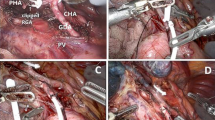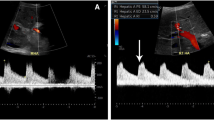Abstract
Background
Patients with hepatocellular carcinoma (HCC) and portal vein hypertension assessed with platelet count (PVH-PLT; platelet count < 100,000/mL) are often denied surgery even when the disease is technically resectable. Short- and long-term outcomes of patients undergoing minimally invasive surgery (MIS) versus open resection for HCC and PVH-PLT were compared.
Methods
Propensity score matching (PSM) was used to balance the clinicopathological differences between MIS and non-MIS patents. Univariate comparison and standard survival analyses were utilized.
Results
Among 1974 patients who underwent surgery for HCC, 13% had a PVH-PLT and 33% underwent MIS. After 1:1 PSM, 407 MIS and 407 non-MIS patients were analyzed. Incidence of complications and length-of-stay (LoS) were higher among non-MIS versus MIS patients (both p ≤ 0.002). After PSM, among 178 PVH-PLT patients (89 MIS and 89 non-MIS), patients who underwent a non-MIS approach had longer LoS (> 7 days; non-MIS: 55% vs. MIS: 29%), as well as higher morbidity (non-MIS: 42% vs. MIS: 29%) [p <0.001]. In contrast, long-term oncological outcomes were comparable, including 3-year overall survival (non-MIS: 66.2% vs. MIS: 72.9%) and disease-free survival (non-MIS: 47.3% vs. MIS: 50.2%) [both p ≥ 0.08].
Conclusion
An MIS approach was associated with improved short-term outcomes, but similar long-term outcomes, compared with open liver resection for patients with HCC and PVH-PLT. An MIS approach for liver resection should be considered for patients with HCC, even those individuals with PVH-PLT.

Similar content being viewed by others
References
Bray F, Ferlay J, Soerjomataram I, Siegel RL, Torre LA, Jemal A. Global cancer statistics 2018: GLOBOCAN estimates of incidence and mortality worldwide for 36 cancers in 185 countries. CA Cancer J Clin. 2018;68(6):394–424.
Marrero JA, Kulik LM, Sirlin CB, Zhu AX, Finn RS, Abecassis MM, et al. diagnosis, staging, and management of hepatocellular carcinoma: 2018 practice guidance by the American Association for the Study of Liver Diseases. Hepatology. 2018;68(2):723–50.
European Association for the Study of the Liver. EASL clinical practice guidelines: management of hepatocellular carcinoma. J Hepatol. 2018;69(1):182–236.
Kinoshita A, Onoda H, Fushiya N, Koike K, Nishino H, Tajiri H. Staging systems for hepatocellular carcinoma: current status and future perspectives. World J Hepatol. 2015;7(3):406–24.
Bagante F, Spolverato G, Strasberg SM, Gani F, Thompson V, Hall BL, et al. Minimally invasive vs. open hepatectomy: a comparative analysis of the national surgical quality improvement program database. J Gastrointest Surg. 2016;20(9):1608–17.
Chen Q, Merath K, Bagante F, Akgul O, Dillhoff M, Cloyd J, et al. A comparison of open and minimally invasive surgery for hepatic and pancreatic resections among the medicare population. J Gastrointest Surg. 2018;22(12):2088–96.
Abu Hilal M, Aldrighetti L, Dagher I, Edwin B, Troisi RI, Alikhanov R, et al. The southampton consensus guidelines for laparoscopic liver surgery: from indication to implementation. Ann Surg. 2018;268(1):11–8.
Witowski J, Rubinkiewicz M, Mizera M, Wysocki M, Gajewska N, Sitkowski M, et al. Meta-analysis of short- and long-term outcomes after pure laparoscopic versus open liver surgery in hepatocellular carcinoma patients. Surg Endosc. 2019;33(5):1491–1507.
Xiong JJ, Altaf K, Javed MA, Huang W, Mukherjee R, Mai G, et al. Meta-analysis of laparoscopic vs open liver resection for hepatocellular carcinoma. World J Gastroenterol. 2012;18(45):6657–68.
Yoon YI, Kim KH, Kang SH, Kim WJ, Shin MH, Lee SK, et al. Pure laparoscopic versus open right hepatectomy for hepatocellular carcinoma in patients with cirrhosis: a propensity score matched analysis. Ann Surg. 2017;265(5):856–63.
Shehta A, Han HS, Yoon YS, Cho JY, Choi Y. Laparoscopic liver resection for hepatocellular carcinoma in cirrhotic patients: 10-year single-center experience. Surg Endosc. 2016;30(2):638–48.
Morise Z, Ciria R, Cherqui D, Chen KH, Belli G, Wakabayashi G. Can we expand the indications for laparoscopic liver resection? A systematic review and meta-analysis of laparoscopic liver resection for patients with hepatocellular carcinoma and chronic liver disease. J Hepatobiliary Pancreat Sci. 2015;22(5):342–52.
Harada N, Maeda T, Yoshizumi T, Ikeda T, Kayashima H, Ikegami T, et al. Laparoscopic liver resection is a feasible treatment for patients with hepatocellular carcinoma and portal hypertension. Anticancer Res. 2016;36(7):3489–97.
Goh EL, Chidambaram S, Ma S. Laparoscopic vs open hepatectomy for hepatocellular carcinoma in patients with cirrhosis: a meta-analysis of the long-term survival outcomes. Int J Surg. 2018;50:35–42.
Cai X, Liang X, Yu T, Liang Y, Jing R, Jiang W, et al. Liver cirrhosis grading Child-Pugh class B: a Goliath to challenge in laparoscopic liver resection? Prior experience and matched comparisons. Hepatobiliary Surg Nutr. 2015;4(6):391–7.
Kawaguchi Y, Fuks D, Kokudo N, Gayet B. Difficulty of laparoscopic liver resection: proposal for a new classification. Ann Surg. 2018;267(1):13–7.
Popescu I, Campeanu I. Surgical anatomy of the liver and liver resection. Brisbane 2000 Terminology. Chirurgia (Bucharest). 2009;104(1):7–10.
Clavien PA, Barkun J, de Oliveira ML, Vauthey JN, Dindo D, Schulick RD, et al. The Clavien-Dindo classification of surgical complications: five-year experience. Ann Surg. 2009;250(2):187–96.
Bagante F, Ruzzenente A, Beal EW, Campagnaro T, Merath K, Conci S, et al. Complications after liver surgery: a benchmark analysis. HPB (Oxford). 2019;21(9):1139–49.
Austin PC. Balance diagnostics for comparing the distribution of baseline covariates between treatment groups in propensity-score matched samples. Stat Med. 2009;28(25):3083–107.
Sekhon JS. Multivariate and propensity score matching software with automated balance optimization: the matching package for R. J Stat Softw. 2011;42(7):1–52.
van Gulik T. Open versus laparoscopic resection for liver tumours. HPB (Oxford). 2009;11(6):465–8.
Buell JF, Cherqui D, Geller DA, O’Rourke N, Iannitti D, Dagher I, et al. The international position on laparoscopic liver surgery: the Louisville statement, 2008. Ann Surg. 2009;250(5):825–30.
Wakabayashi G, Cherqui D, Geller DA, Buell JF, Kaneko H, Han HS, et al. Recommendations for laparoscopic liver resection: a report from the second international consensus conference held in Morioka. Ann Surg. 2015;261(4):619–29.
Gruttadauria S, Tropea A, Pagano D, Guarini A, Liotta R, Ling T, et al. Mini-Invasive Approach Contributes To Expand The Indication For Liver Resection For Hepatocellular Carcinoma Without Increasing The Incidence Of Posthepatectomy Liver Failure And Other Perioperative Complications: A Single-Center Analysis. J Laparoendosc Adv Surg Tech A. 2016;26(6):439–46.
Sposito C, Battiston C, Facciorusso A, Mazzola M, Muscara C, Scotti M, et al. Propensity score analysis of outcomes following laparoscopic or open liver resection for hepatocellular carcinoma. Br J Surg. 2016;103(7):871–80.
Di Sandro S, Danieli M, Ferla F, Lauterio A, De Carlis R, Benuzzi L, et al. The current role of laparoscopic resection for HCC: a systematic review of past ten years. Transl Gastroenterol Hepatol. 2018;3:68.
Amato B, Aprea G, De Rosa D, Milone M, di Domenico L, Amato M, et al. Laparoscopic hepatectomy for HCC in elderly patients: risks and feasibility. Aging Clin Exp Res. 2017;29(Suppl 1):179–83.
Gil E, Kwon CHD, Kim JM, Choi GS, Heo JS, Cho W, et al. Laparoscopic liver resection of hepatocellular carcinoma with a tumor size larger than 5 cm: review of 45 cases in a tertiary institution. J Laparoendosc Adv Surg Tech A. 2017;27(8):799–803.
Cipriani F, Fantini C, Ratti F, Lauro R, Tranchart H, Halls M, et al. Laparoscopic liver resections for hepatocellular carcinoma. Can we extend the surgical indication in cirrhotic patients? Surg Endosc. 2018;32(2):617–26.
Ciria R, Gomez-Luque I, Ocana S, Cipriani F, Halls M, Briceno J, et al. A systematic review and meta-analysis comparing the short- and long-term outcomes for laparoscopic and open liver resections for hepatocellular carcinoma: updated results from the European guidelines meeting on laparoscopic liver surgery, Southampton, UK, 2017. Ann Surg Oncol. 2019;26(1):252–63.
Bruix J, Sherman M, Practice guidelines committee, american association for the study of liver diseases. Management of hepatocellular carcinoma. Hepatology. 2005;42(5):1208–36.
Bruix J, Sherman M, American association for the study of liver D. Management of hepatocellular carcinoma: an update. Hepatology. 2011;53(3):1020–2.
Santambrogio R, Kluger MD, Costa M, Belli A, Barabino M, Laurent A, et al. Hepatic resection for hepatocellular carcinoma in patients with Child-Pugh’s A cirrhosis: is clinical evidence of portal hypertension a contraindication? HPB (Oxford). 2013;15(1):78–84.
Capussotti L, Ferrero A, Vigano L, Muratore A, Polastri R, Bouzari H. Portal hypertension: contraindication to liver surgery? World J Surg. 2006;30(6):992–9.
Lim C, Osseis M, Lahat E, Doussot A, Sotirov D, Hemery F, et al. Safety of laparoscopic hepatectomy in patients with hepatocellular carcinoma and portal hypertension: interim analysis of an open prospective study. Surg Endosc. 2019;33(3):811–20.
Sahara K, Paredes AZ, Tsilimigras DI, Hyer JM, Merath K, Wu L, et al. Impact of liver cirrhosis on perioperative outcomes among elderly patients undergoing hepatectomy: the effect of minimally invasive surgery. J Gastrointest Surg. 2019;23(12):2346–53.
Pawlik TM. Minimally invasive oncologic surgery. Surg Oncol Clin N Am. 2019;28(1):xiii–xiv.
Cloyd JM, Pawlik TM. Minimally invasive hepatopancreatobiliary surgery: where do we go from here? Surg Oncol. 2018;27(1):A2–A4.
Fuentes JM, Hanly EJ, Aurora AR, De Maio A, Shih SP, Marohn MR, et al. CO2 abdominal insufflation pretreatment increases survival after a lipopolysaccharide-contaminated laparotomy. J Gastrointest Surg. 2006;10(1):32–8.
Bachman SL, Hanly EJ, Nwanko JI, Lamb J, Herring AE, Marohn MR, et al. The effect of timing of pneumoperitoneum on the inflammatory response. Surg Endosc. 2004;18(11):1640–4.
Goldfarb M, Brower S, Schwaitzberg SD. Minimally invasive surgery and cancer: controversies part 1. Surg Endosc. 2010;24(2):304–34.
Clinical Outcomes of Surgical Therapy Study Group; Nelson H, Sargent DJ, Wieand HS, Fleshman J, Anvari M, et al. A comparison of laparoscopically assisted and open colectomy for colon cancer. N Engl J Med. 2004;350(20):2050–9.
Veldkamp R, Kuhry E, Hop WC, Jeekel J, Kazemier G, Bonjer HJ, et al. Laparoscopic surgery versus open surgery for colon cancer: short-term outcomes of a randomised trial. Lancet Oncol. 2005;6(7):477–84.
Author information
Authors and Affiliations
Corresponding author
Additional information
Publisher's Note
Springer Nature remains neutral with regard to jurisdictional claims in published maps and institutional affiliations.
Dr. Bagante’s research is supported by the International Hepato-Pancreato-Biliary Association (IHPBA) Kenneth Warren Fellowship 2017–2018. Andrea Ruzzenente and Fabio Bagante shared first authorship. Alfredo Guglielmi, Luca Aldrighetti, and Timothy M. Pawlik shared senior authorship.
Electronic supplementary material
Below is the link to the electronic supplementary material.
Rights and permissions
About this article
Cite this article
Ruzzenente, A., Bagante, F., Ratti, F. et al. Minimally Invasive Versus Open Liver Resection for Hepatocellular Carcinoma in the Setting of Portal Vein Hypertension: Results of an International Multi-institutional Analysis. Ann Surg Oncol 27, 3360–3371 (2020). https://doi.org/10.1245/s10434-020-08444-3
Received:
Published:
Issue Date:
DOI: https://doi.org/10.1245/s10434-020-08444-3




